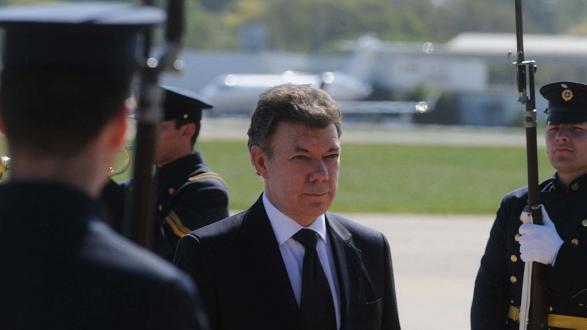In:
Global Beat is your weekly stop for news from around the world. Join us every Friday morning for important stories you should know about.
This week, more than 7,000 FARC rebels turn in their weapons as part of the Colombian peace agreement; a new computer virus from the Ukraine wreaks havoc on governments and businesses worldwide; a generic and inexpensive HIV drug will be introduced in Kenya, Nigeria, and Uganda; and more.
____________________
Americas
A half century of armed insurgency in Colombia came to a conclusion this week as more than 7,000 FARC rebels turned over their weapons in a low-key ceremony certified by the United Nations. FARC’s top leader, Rodrigo Londoño, bid "farewell to arms, farewell to war, welcome to peace." Colombian President Juan Manuel Santos said, "today is a special day, the day when weapons are exchanged for words." More than 260,000 people were killed during the 52-year conflict, tens of thousands went missing, and millions were forced from their homes.
Also check out:
- President Michel Temer of Brazil is charged with corruption – Dom Phillips, The New York Times
Central & South Asia
Tensions are rising on the border between India and Tibet, as China has accused India of incursion into its territory. Officials claimed Indian border guards had obstructed "normal activities" on the Chinese side, and called on India to immediately withdraw. The area, the Nathu La mountain pass, was the site of a hostile border clash between Chinese and Indian troops in 1967. Indians use the pass for pilgrimages to Hindu and Buddhist sites in Tibet. As a result of the tensions, Beijing has blocked official pilgrimages across the boundary. There has been no official comment from India on the accusations so far.
Also check out:
- Pakistan: A catch-22 in the India-U.S. "special" relationship – Umair Jamal, The Diplomat
China & East Asia
For the first time since becoming the president of China, Xi Jinping will visit Hong Kong this week to celebrate the 20th anniversary of its return from Britain. The visit also marks the beginning of Carrie Lam’s first term as Hong Kong’s Chief Executive. President Xi is expected to issue reassurances that Beijing still respects the "one-country, two-system" framework negotiated by China and Britain, which gave the city its own judicial system and limited autonomy for 50 years after Britain’s departure. However, Beijing has pressed the limits of that agreement, and Xi’s visit is expected to spark protests from pro-democracy demonstrators.
Also check out:
Europe & Russia
A new computer virus spread from the Ukraine this week, wreaking havoc on governments and businesses worldwide. According to international cyber experts, the virus silently infected computers after users downloaded a tax accounting package or visited a local Ukrainian news site. From there, the malicious code locked computers and demanded victims post a ransom worth $300 in Bitcoins or lose their data entirely. Given the relatively small sum demanded, experts speculate the attack was not aimed at financial gain, but rather mass disruption. An increasing number of global cyberattacks, including those targeting the election campaigns of Hillary Clinton and Emmanuel Macron, have sparked warnings and concerns of a "permanent war" online.
Also check out:
- Germany to vote on same-sex marriage after Merkel drops opposition – Kate Connolly, The Guardian
Middle East & North Africa
Turkish President Recep Tayyip Erdoğan rejected a demand by Saudi Arabia to withdraw Turkey's troops from Qatar, and instead reaffirmed Turkey's support for the besieged Gulf state. The diplomatic crisis escalated last week, when Saudi Arabia gave Qatar 10 days to comply with a list of 13 demands, which included closing the state-funded broadcasting network Al Jazeera, scaling back contact with Iran, removing Turkish troops from its soil, and severing ties with the Muslim Brotherhood. The Turkish president described the demands as disrespectful and "against international law." Saudi Arabia has not yet spelled out what it intends to do if Qatar does not comply with its demands.
Also check out:
- Iraq army: ISIL will fall in Mosul "in a few days" – Al Jazeera
Southeast Asia & Oceania
Thailand is seeking U.S. cooperation following its inclusion on the 2017 Trafficking in Persons Report, released earlier this week. The report said that although Thailand reported more investigations, prosecutions, and convictions of trafficking cases, it did not demonstrate "increasing efforts compared to the previous reporting period." The report also cited a failure to convict officials complicit in trafficking crimes as a continued impediment to anti-trafficking efforts in Thailand. Meanwhile, Malaysia has been taken off the watch list, as the Malaysian government demonstrated increasing efforts compared to the previous reporting period. Also according to the strongly worded report, China is among the world’s worst offenders for allowing modern slavery to thrive within its borders.
Also check out:
- Philippines bill proposes jail time for unenthusiastic anthem singers – Janie Octia and Joshua Berlinger, CNN
Sub-Saharan Africa
Kenya will be the first African nation to introduce a generic version of Dolutegravir (DTG), the drug of choice for people living with HIV, officials announced on Wednesday. Nigeria and Uganda will introduce the drug later this year, according to the global health initiative Unitaid. Sub-Saharan Africa is the region most affected by HIV, accounting for two-thirds of the world’s new HIV infections each year. It can take up to a decade for new drugs to be introduced into lower income countries, and although some patients on the continent have accessed the more expensive version, the affordability of the generic DTG will be a "game changer" in the treatment of HIV/AIDS, said Robert Matiru, Unitaid director of operations.
Also check out:
- UN council urges Eritrea and Djibouti to end border dispute – Edith Lederer, Washington Post




